

Modificeert Monsanto niet alleen voeding maar ook wetenschappelijk onderzoek? Door de toenemende invloed van de economie op de samenleving, neemt ook de invloed van de industrie op de wetenschap toe.
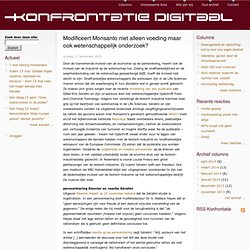
Zolang de onafhankelijkheid en de waarheidsvinding van de wetenschap gewaarborgd blijft, hoeft die invloed niet slecht te zijn. Onafhankelijke wetenschappers die werkzaam zijn in de Life Sciences menen echter dat die waarborging in hun discipline wel in gevaar wordt gebracht. A Comparison of the Effects of Three GM Corn Varieties on Mammalian Health. Int J Biol Sci 2009; 5(7):706-726. doi:10.7150/ijbs.5.706 Research Paper Joël Spiroux de Vendômois1, François Roullier1, Dominique Cellier1,2, Gilles-Eric Séralini1,3 1.
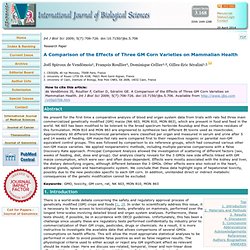
CRIIGEN, 40 rue Monceau, 75008 Paris, France2. University of Rouen LITIS EA 4108, 76821 Mont-Saint-Aignan, France3. How to cite this article: de Vendômois JS, Roullier F, Cellier D, Séralini GE. We present for the first time a comparative analysis of blood and organ system data from trials with rats fed three main commercialized genetically modified (GM) maize (NK 603, MON 810, MON 863), which are present in food and feed in the world. Genetisch gemodificeerd voedsel en landbouw. Planten die beter tegen droogte kunnen.
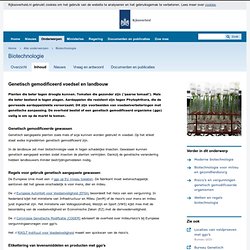
Tomaten die gezonder zijn (‘paarse tomaat’). Maïs die beter bestand is tegen plagen. Aardappelen die resistent zijn tegen Phytophthora, die de gevreesde aardappelziekte veroorzaakt. Dit zijn voorbeelden van voedselverbeteringen met genetische aanpassing. De overheid beslist of een genetisch gemodificeerd organisme (ggo) veilig is om op de markt te komen. Genetisch gemodificeerde gewassen Genetisch aangepaste planten zoals maïs of soja kunnen worden gebruikt in voedsel. Séralini affair. The Séralini affair began in September 2012, and involved the publication of an experiment conducted by a group led by Gilles-Éric Séralini.[1] The experiments involved feeding Monsanto's RoundUp-resistant NK603 maize (called corn in North America) and the herbicide RoundUp to rats, over the rats' two-year lifespan.[2] Séralini had required that journalists, in order to receive a copy of the paper prior to the press conference, sign a confidentiality agreement that prohibited them from contacting other researchers for comment before the press conference.
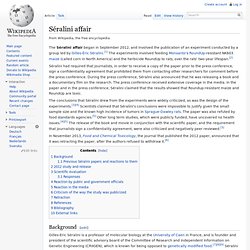
During the press conference, Séralini also announced that he was releasing a book and a documentary film on the research. The press conference received extensive coverage in the media. In the paper and in the press conference, Séralini claimed that the results showed that Roundup-resistant maize and RoundUp are toxic. Background[edit] Previous Séralini papers and reactions to them[edit] 2012 study and release[edit]
Open Access Journals Platform. New guidance paves way to labeling of genetically modified food. "We are particularly pleased that the new guidance recognizes that GM labeling is justified as a tool for post market monitoring," Michael Hansen, Consumers International's lead delegate to the regulators' meeting in Geneva, said in a statement.
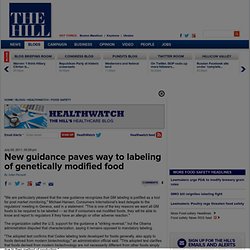
"This is one of the key reasons we want all GM foods to be required to be labelled — so that if consumers eat modified foods, they will be able to know and report to regulators if they have an allergic or other adverse reaction. " The organization called the U.S. support for the guidance a "striking reversal," but the Obama administration disputed that characterization, saying it remains opposed to mandatory labeling. "The adopted text confirms that Codex labeling texts developed for foods generally, also apply to foods derived from modern biotechnology," an administration official said. Wp-content/uploads/2013/05/JHTD-1-104.pdf. Wp-content/uploads/2013/05/JHTD-1-104.pdf. New Study Links GMO Food To Leukemia. By Sayer Ji GreenMedInfo.com A new study, yet to receive any media attention, reveals the “leukemogenic” properties of the Bt toxin biopesticides engineered into the vast majority of GMO food crops already within the US food supply.
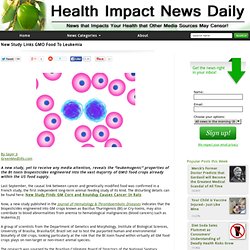
Last September, the causal link between cancer and genetically modified food was confirmed in a French study, the first independent long-term animal feeding study of its kind. The disturbing details can be found here: New Study Finds GM Corn and Roundup Causes Cancer In Rats Now, a new study published in the Journal of Hematology & Thromboembolic Diseases indicates that the biopesticides engineered into GM crops known as Bacillus Thuringensis (Bt) or Cry-toxins, may also contribute to blood abnormalities from anemia to hematological malignancies (blood cancers) such as leukemia. [i] The researchers also found that one of the prevailing myths about the selective toxicity of Bt to insects, the target species, no longer holds true: Food companies realize that #GMO labeling is an inevitability. After all, 61 countries already require it. Why #GMO Sci still says NO!